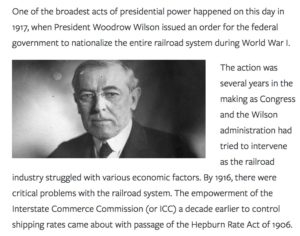Nationalism, Globalism, and The Commanding Heights
For Lincoln-Douglas debaters, the 2017-2018 Resolution –Resolved: Nationalism ought to be valued above globalism, invites research and discussion of U.S. and European history and economics. Global trade, investment, and migration have been central to the U.S. experience since colonial times. But nationalism’s history varies from country to country going back to the rise of European nation-states.
National Socialism in 1930s Germany (Nationalsozialismus or Nazi) were influenced by Benito Mussolini’s ideas and policies in Italy. Fascism (national socialism) in Italy drew from Lenin and communism. Historian Paul Johnson, in this video clip from The New Enlightenment, explains that Mussolini, the first fascist dictator, began as a socialist and “he developed a theory of socialism for Italy that met with the full approval of Lenin.”
After World War II and the defeat of the Axis powers, nationalist (and socialist) policies remained popular across much of the world (across Europe and Middle East/North Africa, for example).

https://constitutioncenter.org/blog/on-this-day-woodrow-wilson-seizes-the-nations-railroads
After the war the English government nationalized it major industries creating British Rail, British Steel, British Telecom, and British Airways. In the United States during World War I, President Wilson nationalized the railroads and though were returned to private ownership after the war, railroads remained heavily regulated, went mostly bankrupt, and were nationalized again in the 1970s.
Students can learn more of the popularity of economic nationalism from the book and PBS documentary The Commanding Heights. Soviet economic policies failed badly in the USSR by 1921 and people were starving. To save the day Lenin called for market reforms (the New Economic Policy or NEP) returning farms and shop to private ownership. But as the video clip below explains, Lenin called for state ownership of heavy industries like coal, railroads, and steel production, what Lenin called the Commanding Heights of the economy.
A Commanding Heights segment begins in Vienna with Ludwig von Mises, the Austrian economist who explained why socialism, without prices and markets, will fail, and continues with the collapse of the Soviet economy and Lenin’s economic reforms.
[Here is link to old PBS website: https://www.pbs.org/wgbh/commandingheights/ ]
An earlier post for policy debaters researching a U.S./Middle East policy topic looked at the popularity of (classical) liberal ideas among intellectuals in Egypt in the first half of the twentieth century. Classical liberal ideas are the oppose nationalism (though don’t favor global agencies and bureaucracies).
Though many scholars and intellectuals in Europe and the U.S. were captivated by utopian, “progressive,” socialist and nationalist ideas other scholars argued against collectivist policies, defending instead strong civil society institutions, limited government, and open international movement of goods, investments, and people.
 Ludwig von Mises was a powerful advocate of classical liberal principles and policies. His book Liberalism: The Classical Tradition was first published in 1927. Bettina Bien Greaves explains the title in the preface to the 1985 edition of Liberalism:
Ludwig von Mises was a powerful advocate of classical liberal principles and policies. His book Liberalism: The Classical Tradition was first published in 1927. Bettina Bien Greaves explains the title in the preface to the 1985 edition of Liberalism:
The term “liberalism,” from the Latin “liber” meaning “free,” referred originally to the philosophy of freedom. It still retained this meaning in Europe when this book was written (1927) so that readers who opened its covers expected an analysis of the freedom philosophy of classical liberalism. Unfortunately, however, in recent decades, “liberalism” has come to mean something very different. The word has been taken over, especially in the United States, by philosophical socialists and used by them to refer to their government intervention and “welfare state” programs.
 Liberalism is available online from the Liberty Fund,with the full text on the Online Library of Liberty.
Liberalism is available online from the Liberty Fund,with the full text on the Online Library of Liberty.
In “Chapter 3: Liberal Foreign Policy” Mises explains that domestic and international policies are closely linked.
Consider the discussion in Liberalism of the right of self-determination:
The liberals of an earlier age thought that the peoples of the world were peaceable by nature and that only monarchs desire war in order to increase their power and wealth by the conquest of provinces. They believed, therefore, that to assure lasting peace it was sufficient to [79] replace the rule of dynastic princes by governments dependent on the people. If a democratic republic finds that its existing boundaries, as shaped by the course of history before the transition to liberalism, no longer correspond to the political wishes of the people, they must be peacefully changed to conform to the results of a plebiscite expressing the people’s will. It must always be possible to shift the boundaries of the state if the will of the inhabitants of an area to attach themselves to a state other than the one to which they presently belong has made itself clearly known. In the seventeenth and eighteenth centuries, the Russian Czars incorporated into their empire large areas whose population had never felt the desire to belong to the Russian state. Even if the Russian Empire had adopted a completely democratic constitution, the wishes of the inhabitants of these territories would not have been satisfied, because they simply did not desire to associate themselves in any bond of political union with the Russians. Their democratic demand was: freedom from the Russian Empire; the formation of an independent Poland, Finland, Latvia, Lithuania, etc. The fact that these demands and similar ones on the part of other peoples (e.g., the Italians, the Germans in Schleswig-Holstein, the Slavs in the Hapsburg Empire) could be satisfied only by recourse to arms was the most important cause of all the wars that have been fought in Europe since the Congress of Vienna. (Link to paragraph)
By this standard, policies toward Catalonian voters favoring independence, Kurdish regions in Syria and Iraq, as well as other independence movements should be one of defending the plasticity of political boundaries:
It must always be possible to shift the boundaries of the state if the will of the inhabitants of an area to attach themselves to a state other than the one to which they presently belong has made itself clearly known.
 In the United States the word liberal was adopted by opponents of classical liberalism. Progressives, socialists, and even Karl Marx understood the tremendous advances that liberal policies brought to the western world, but felt that new economic and social institutions could take the rest of mankind “to the next level” of economic progress and social equality. Word meanings shifted, as documented in the Lost Language website (post here on site and LD topic).
In the United States the word liberal was adopted by opponents of classical liberalism. Progressives, socialists, and even Karl Marx understood the tremendous advances that liberal policies brought to the western world, but felt that new economic and social institutions could take the rest of mankind “to the next level” of economic progress and social equality. Word meanings shifted, as documented in the Lost Language website (post here on site and LD topic).
There have always been opponents of the principles and policies of classical liberal economists. Advocates for free trade and against mercantilism were opposed by aristocrats and mercantilists who benefited from government policies that protected their land rents and domestic production.
 Not everyone benefits when the poor have more options for better-paying jobs in a fast-expanding market economy. Aristocrats struggled some as the price of household help went through the roof. Once the rural poor could find better jobs in nearby factories and cities, or in the manufacturing towns in the north of England, it became much harder to keep the horses groomed, mansions dusted, and beds turned down each evening. English elites soon called economics “the dismal science” since it disrupted what they saw as the natural order of things. This 2013 Atlantic post explains the actual origin of the dismal science. And this earlier Library of Economics and Liberty (Econlib) article tells the story in more detail.
Not everyone benefits when the poor have more options for better-paying jobs in a fast-expanding market economy. Aristocrats struggled some as the price of household help went through the roof. Once the rural poor could find better jobs in nearby factories and cities, or in the manufacturing towns in the north of England, it became much harder to keep the horses groomed, mansions dusted, and beds turned down each evening. English elites soon called economics “the dismal science” since it disrupted what they saw as the natural order of things. This 2013 Atlantic post explains the actual origin of the dismal science. And this earlier Library of Economics and Liberty (Econlib) article tells the story in more detail.
 A century ago the nationalist policies of European nation-states led the leading European industrial powers into total war and engulfed, destroyed, and transformed much of the world. World War I opened what Robert Nisbet referred to as the “seventy-five year war.” See Nisbet’s short book The Present Age, also online at the Online Library of Liberty. Woodrow Wilson altered the U.S. economy and political system by taking the U.S. into WWI, and nationalizing U.S. railroads was a part of that.
A century ago the nationalist policies of European nation-states led the leading European industrial powers into total war and engulfed, destroyed, and transformed much of the world. World War I opened what Robert Nisbet referred to as the “seventy-five year war.” See Nisbet’s short book The Present Age, also online at the Online Library of Liberty. Woodrow Wilson altered the U.S. economy and political system by taking the U.S. into WWI, and nationalizing U.S. railroads was a part of that.
On the one hundredth anniversary of World War I, studying its causes and consequences should be a part of every student’s history education and research.
Enthusiasm for controlling the Commanding Heights of national economies spread among intellectuals and politicians from the USSR to Europe and the U.S.. Franklin Roosevelt’s New Deal braintrust was inspired by nationalist economic policies then thought successful Europe and the USSR, and at least thought an improvement over the U.S. economy then in The Great Depression.
Below: screenshot from Land of the Soviets, clip shown in segment from British documentary The New Enlightenment (link above).

